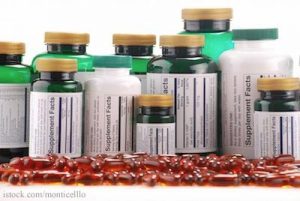There is a lot of confusion about the dietary supplement industry, what products they are allowed to sell, and how they are regulated. Before 1990, supplements were mainly just vitamins and minerals. Interest peaked in the early 1990s, and more manufacturers got into the business. Congress wanted to strengthen the FDA’s enforcement powers over misleading claims and unscrupulous manufacturers.
 But in 1994, outfits such as Mercola and other supplement supporters got the Dietary Supplement Health and Education Act passed. It was heavily supported by the supplement industry. In addition, companies got consumers involved, telling them that the government was going to take away their supplements. That was a lie.
But in 1994, outfits such as Mercola and other supplement supporters got the Dietary Supplement Health and Education Act passed. It was heavily supported by the supplement industry. In addition, companies got consumers involved, telling them that the government was going to take away their supplements. That was a lie.
A huge groundswell of public opinion helped get the Act passed. Dietary supplements are now exempt from food additive regulations. Before the DSHEA passed, the FDA could challenge the use of non-nutritive ingredients in supplements as unapproved food additives. They can no longer do that.
Now, you have no way of knowing exactly what’s in those supplements you buy. To market a supplement, a manufacturer just has to make a product and send a letter to the FDA saying they “don’t expect any negative side effects from the product.” No safety warnings are required. As long as the product doesn’t contain a “new dietary ingredient”, no approval by the FDA or any authority is needed before these products are sold to the public. And who decides if an ingredient is “new”? The manufacturer.
These are the laws governing supplements: They can contain vitamins, minerals, herbs, amino acids, organ tissues, or a concentrate or extract of those ingredients. They cannot be represented as food. Manufacturers can put statements about how a product affects the body on the bottle, such as “builds strong bones.” The only thing they cannot claim is that supplements can cure or treat diseases. But many companies use those claims anyway, until the FDA shuts them down.
Hormones such as melatonin and DHEA are marketed as supplements. So are energy drinks, which are the focus of government investigation after they have been associated with many deaths. Energy drink makers, in fact, deliberately classified their products as “supplements” instead of food beverages so they could avoid putting the caffeine content on the label of their drinks.
And many supplements don’t contain the ingredients they claim to on the label: many herbal supplements, for instance, are made of ground up rice and weeds. In a Canadian study, scientists found that most herbal supplements, in fact, contained plant matter not listed on the label, such as wheat, a problem for celiac patients.
To make matters worse, the FDA can’t ban supplements as “unapproved food additives” unless it’s been proven they are UNsafe. And manufacturers can charge lots of money for completely useless ingredients. The only way the FDA can get a dangerous supplement off the market is to rely on adverse event reports. The burden of proof lies with the FDA after someone has been injured or killed by these products.
Between 2007 and mid-April 2012, there were more than 6,300 reports of serious illness caused by supplements, including 2,100 hospitalizations and 115 deaths. Not surprisingly, in 2007, a federal law forced manufacturers to report adverse events to the FDA.
You can read about the problems with the supplements you buy at ConsumerLab. Consumers Union has been reporting about unsafe supplements and the problems with lack of regulation for years. They support the Dietary Labeling Act of 2013. And so should informed consumers.




